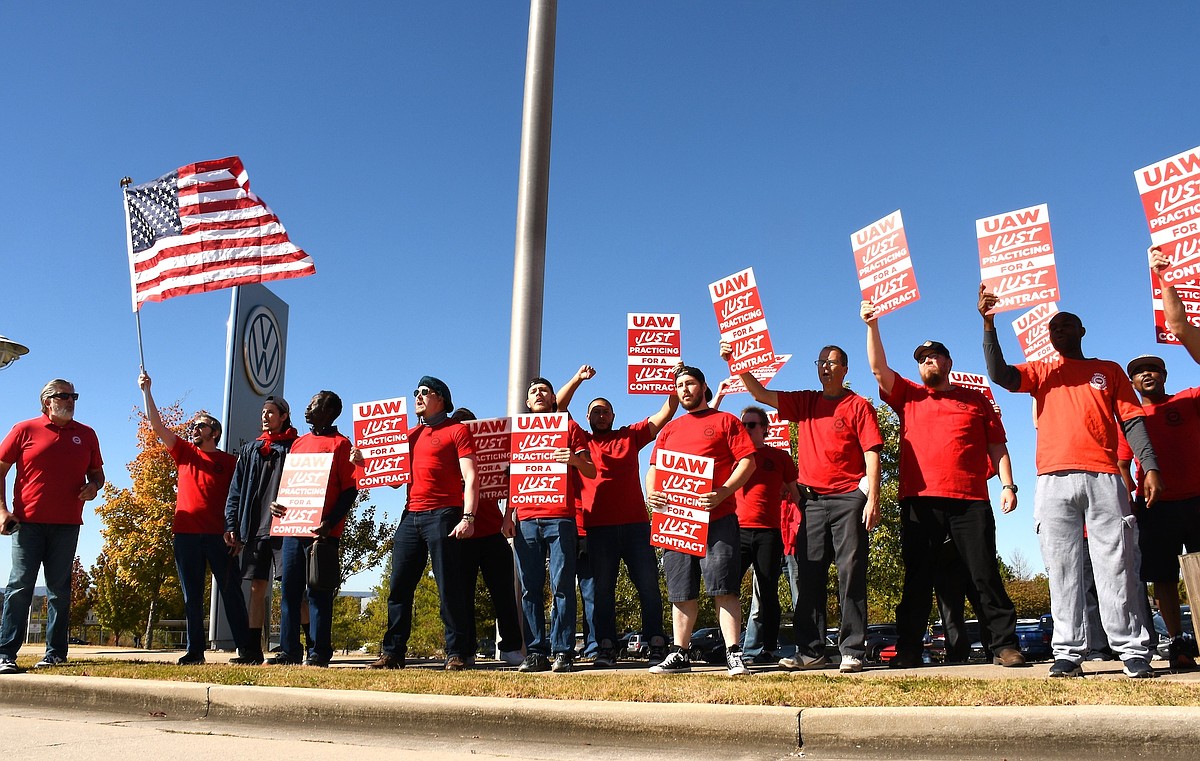Opinion: VW-UAW conflict is a fight over economic equality – Chattanooga Times Free Press

Report on Labor Negotiations at Volkswagen Chattanooga Plant and Alignment with Sustainable Development Goals
Executive Summary
This report examines the status of labor negotiations at the Volkswagen automotive plant in Chattanooga. More than one year after employees voted for union representation by the United Auto Workers (UAW), a collective bargaining agreement has not been reached. This ongoing situation has significant implications for several United Nations Sustainable Development Goals (SDGs), particularly those concerning labor rights, institutional justice, and economic equality.
Background of the Labor Dispute
The central issue revolves around the failure to finalize an initial labor contract following a successful unionization vote by the workforce. Key details include:
- Parties Involved: Volkswagen Group of America and the United Auto Workers (UAW), representing the plant’s employees.
- Timeline: The period of negotiation has extended for well over a year since the official unionization vote.
- Current Status: As of the latest available information, the two parties have failed to agree on the terms of a contract.
Analysis of Alignment with Sustainable Development Goals (SDGs)
The protracted negotiations directly impact the achievement of key SDG targets. The failure to establish a formal contract undermines principles foundational to sustainable development and corporate responsibility.
-
SDG 8: Decent Work and Economic Growth
The situation at the Chattanooga plant is critically relevant to SDG 8, which advocates for “full and productive employment and decent work for all.” The inability to secure a collective bargaining agreement challenges the fulfillment of Target 8.8: “Protect labor rights and promote safe and secure working environments for all workers.” Collective bargaining is a fundamental mechanism for protecting these rights, and its absence leaves workers without a formalized structure for fair wages, working conditions, and dispute resolution.
-
SDG 16: Peace, Justice and Strong Institutions
This goal emphasizes the need for “effective, accountable and inclusive institutions at all levels.” The negotiation impasse between Volkswagen and the UAW can be viewed as a challenge to the effectiveness of industrial relations institutions. A prolonged failure to resolve disputes through established bargaining processes indicates a weakness in institutional mechanisms designed to ensure peaceful and just outcomes in labor relations, a core component of a stable society.
-
SDG 10: Reduced Inequalities
Union contracts are a primary tool for addressing wage inequality and ensuring fair compensation, aligning with Target 10.4, which calls for policies to “progressively achieve greater equality.” The delay in finalizing a contract postpones the potential for implementing structured wage scales and benefit packages that could reduce economic disparities among the workforce and contribute to a more equitable distribution of the company’s economic gains.
1. Which SDGs are addressed or connected to the issues highlighted in the article?
- SDG 8: Decent Work and Economic Growth: This is the most directly relevant SDG. The article’s focus on workers unionizing and the subsequent failure to agree on a labor contract with their employer, Volkswagen, is fundamentally an issue of decent work, labor rights, and collective bargaining.
- SDG 10: Reduced Inequalities: The formation of a union and the negotiation of a contract are key mechanisms for workers to advocate for better wages and working conditions, which can help reduce income inequality. The struggle described in the article is part of this broader effort.
- SDG 16: Peace, Justice and Strong Institutions: This goal is relevant as it pertains to the effectiveness of institutions that mediate disputes and uphold rights. The protracted negotiation failure between the United Auto Workers and Volkswagen points to a challenge within the institutional framework of labor relations and dispute resolution.
2. What specific targets under those SDGs can be identified based on the article’s content?
SDG 8: Decent Work and Economic Growth
- Target 8.8: Protect labour rights and promote safe and secure working environments for all workers. The entire situation described in the article relates to this target. The workers exercised their right to “unionize,” which is a fundamental labor right (freedom of association). The subsequent inability to “agree on a contract” with the company highlights the challenges in the collective bargaining process, which is the primary tool for protecting these rights and securing a decent working environment.
SDG 10: Reduced Inequalities
- Target 10.4: Adopt policies, especially fiscal, wage and social protection policies, and progressively achieve greater equality. Collective bargaining agreements, which the article states has “failed to agree on,” are a critical non-governmental policy tool for achieving greater wage equality and securing social protections for workers. The dispute represents a barrier to achieving this target for the employees involved.
3. Are there any indicators mentioned or implied in the article that can be used to measure progress towards the identified targets?
The article does not explicitly mention any official SDG indicators or provide quantitative data. However, the situation it describes directly relates to the qualitative aspects measured by certain indicators.
Target 8.8: Protect labour rights and promote safe and secure working environments for all workers.
- Indicator 8.8.2: Level of national compliance with labour rights (freedom of association and collective bargaining) based on International Labour Organization (ILO) textual sources and national legislation. The article provides a real-world example relevant to this indicator. The fact that workers “voted to unionize” implies that the right to freedom of association is legally permitted. However, the statement that the company and the union have “failed to agree on a contract” for “well over a year” implies a significant challenge or breakdown in the collective bargaining process, which is a key component this indicator is designed to assess. The prolonged dispute itself is a data point suggesting difficulties in the practical application of these rights.
4. Create a table with three columns titled ‘SDGs, Targets and Indicators” to present the findings from analyzing the article. In this table, list the Sustainable Development Goals (SDGs), their corresponding targets, and the specific indicators identified in the article.
| SDGs | Targets | Indicators |
|---|---|---|
| SDG 8: Decent Work and Economic Growth | Target 8.8: Protect labour rights and promote safe and secure working environments for all workers. | Indicator 8.8.2 (Implied): Level of national compliance with labour rights (freedom of association and collective bargaining). The article’s description of a successful unionization vote followed by a year-long failure to agree on a contract serves as a qualitative data point for this indicator. |
| SDG 10: Reduced Inequalities | Target 10.4: Adopt policies, especially fiscal, wage and social protection policies, and progressively achieve greater equality. | Not explicitly mentioned or implied in the article. The failure to secure a contract, which is a mechanism for achieving this target, is the central issue. |
| SDG 16: Peace, Justice and Strong Institutions | No specific target directly identified. The issue relates broadly to the effectiveness of institutions for labor dispute resolution. | Not explicitly mentioned or implied in the article. |
Source: timesfreepress.com
What is Your Reaction?
 Like
0
Like
0
 Dislike
0
Dislike
0
 Love
0
Love
0
 Funny
0
Funny
0
 Angry
0
Angry
0
 Sad
0
Sad
0
 Wow
0
Wow
0

















































































